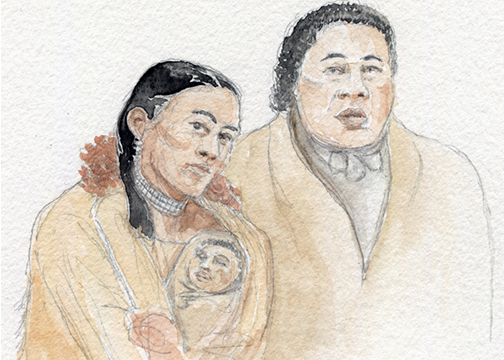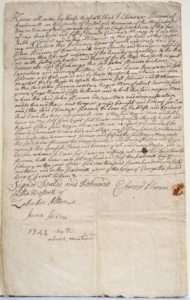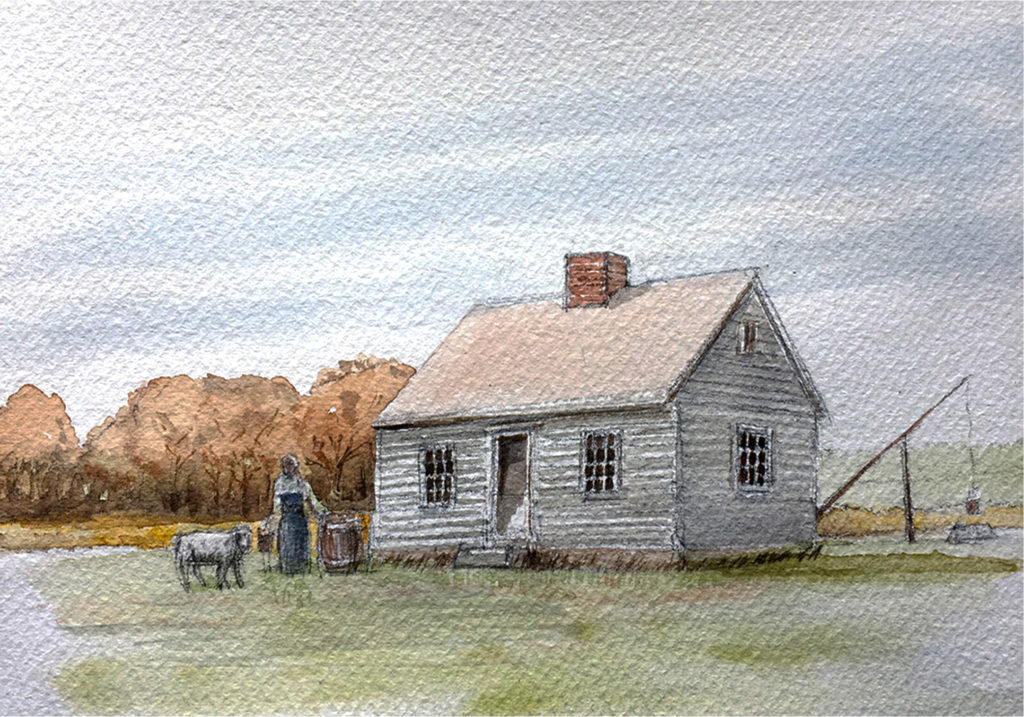The emancipation of Kofi Slocum (c. 1718 – 1772)
Posted on June 7, 2022 by Jenny ONeill
“I was free, but there was no one to welcome me to the land of freedom. I was a stranger in a strange land.”
Attributed to Harriet Tubman

Kofi married Ruth Moses, a Wampanoag woman from Cape Cod and they had 10 children. Illustration by Ray Shaw.
What was the moment of becoming free like for enslaved African Americans? Emancipation provoked a wide range of emotions, all of which are conveyed within a short account of the manumission of Kofi Slocum, the property of the Slocum family of Dartmouth in the 18th century.
You may recognize the name Kofi Slocum (also referred to as Cuff Slocum) as being the father of Paul Cuffe. Kofi’s life has understandably been eclipsed by that of his son Paul Cuffe. However, new research by David Cole refocuses our attention on the extraordinary life of Kofi.
Kofi was from the Ashanti region of West Africa. At the age of about ten, he was sold to African slave traders. By 1728 he had reached Newport where he was purchased by Ebenezer Slocum of Dartmouth.
The circumstances of his freedom, after nearly 20 years of enslavement, are miraculously recorded in an account by his granddaughter Ruth Cuffe. Within the language of this account, we can all recognize familiar emotions of astonishment, joy, fear, and helplessness.

Bill of Sale for Cuff Slocum. He was sold by Ebenezer Slocum to John Slocum in 1742 for the sum of 150 pounds. Reproduced from original in collection of New Bedford Free Public Library
Let’s take a closer look at the account of his becoming free.
(Please note: In this account Kofi is referred to as Cuffe — not to be confused with his son Paul Cuffe.)
Kofi’s path to freedom at the age of approximately 28 is through a form of self-purchase. According to his granddaughter’s account, his new owner:
“wrote down the month and day that he purchased him and how many dollars he gave for him, and when grandfather Cuffe had worked long enough to pay for himself then his master freed him. His master paid him good wages and when he had worked long enough to pay for himself, his master gave him his freedom.”
It seems to be a sudden decision. Kofi receives no advance warning. A document is drawn up by an individual identified as “the squire” to record his emancipation. Slave owner, slave, and the squire have breakfast together:
“the next morning the Squire brought the paper to his house and carried the paper with him and he got there just as they were sitting down to breakfast and they all sat down and Cuffe with them and after they had some breakfast the Squire told Cuffe to take his seat as he wanted to talk with him.
The Squire then asked him did he want to be a free man and be his own man. He said that he wanted to be free but he had no money to buy himself and he wanted his master not to sell him to no one… The squire told Cuffe that he would be a free man in a few minutes. He then took the paper out of his pocket and showed it to Cuffe.”
Kofi expresses his astonishment and concern:
“Then Cuffe cried and covered himself with tears. He said that he did not know what to do and where to go he knew not. He had no home and no money for food that they had ought to let him know of it 2 or 3 weeks ago. Then it would not be so hard to him for then it was a rainy day and where to go he knew not. The squire told him that he must certainly go from there that day for that would show that he was his own free man and gone from there.”
Kofi is hired by the squire:
“The squire told him he would hire him and give him good wages. He hired him right away
The squire then gave Cuffe his paper that he wrote and told him to put into his chest in his protection carrying it with him at his house and keep it safe.”
Kofi receives some advice from his former owner. Kofi leaves immediately:
“Then his master that had been, gave Cuffe good advice while the squire was there. He told him to live a steady life and to take good care of his money that he was going to work for and save it so as to get him a home sometime or other. So Cuffe took 2 suits of his everyday clothes and went away from there that same day.”

The Cuff Slocum home on their farm in Westport on Old County Road. Illustration by Ray Shaw
What happened next?
Emerging from enslavement, Kofi went on to lead a life of independence but continuing connection to his former owners, the Slocums, eventually settling in Westport. He married a Native American with whom he raised a family of 10, among them Paul Cuffe who became one of the most influential voices for the fate of freed slaves.
Kofi died in 1772 at the age of 54. Having lived one third of his life enslaved and thereafter as a free man, Kofi “recognized the meaning of freedom more than most.” (Lamont Thomas). Kofi’s handwritten book of notes and accounts survives in the collection of the New Bedford Public Library. It contains the following message:
“Do good all Do good to All…Give Give Give…Good Do Good at all times I lern to read….Coffe Slocum Mister.”
READ MORE:
The Remarkable Story of Cuff Slocum by David C. Cole
https://paulcuffe.org/2020/05/12/the-remarkable-story-of-cuff-slocum/
Ruth Cuffe’s Testimonial About Her Grandfather’s Freedom
Rise to be a People by Lamont Thomas
Paul Cuffe Personal and Family Papers
https://www.westport-ma.com/historical-documents/pages/cuffe-paul-personal-and-family-papers
